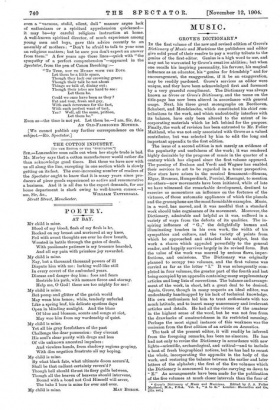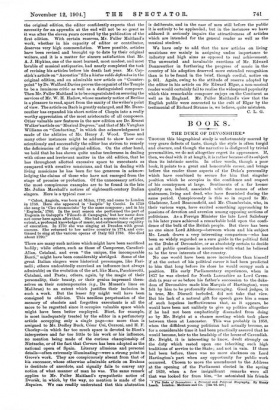IN the first volume of the new and revised edition
of Grove's Dictionary of Music and Musicians the publishers and editor give solid proof of their resolve to pay a worthy tribute to the genius of the first editor. Genius is a high word to use, and may not be warranted by Grove's creative abilities ; but when one recalls his inspiring personality, his fervour, his magical influence as an educator, his "genius for friendship" and for encouragement, the exaggeration, if it be an exaggeration, may be readily pardoned. Grove's services as editor were unique, and they have been acknowledged first and foremost by a very graceful compliment. The Dictionary was always known as Grove or Grove's Dictionary, and the name on the title-page has now been altered in accordance with general usage. Next, his three great monographs on Beethoven, Schubert, and Mendelssohn, which constituted his chief con- tributions to the work, and which undoubtedly interfere with its balance, have only been altered to the extent of in- corporating materials which he left behind for the purpose. Finally, the work of revision has been entrusted to Mr. Fuller Maitland, who was not only associated with Grove as a valued contributor, but was selected by him to edit the long and important appendix to the first edition.
The issue of a second edition is not merely an evidence of the popularity and usefulness of the work; it was rendered highly desirable by the progress of music in the quarter of a century which has elapsed since the first volume appeared. The passing of Brahms and Verdi and Wagner has enabled their services to art to be regarded in a truer perspective. New stars have arisen in the musical firmament—Strauss, Elgar, Bruneau, Humperdinck, Puccini, Mascagni, to mention no others—new movements have been initiated, while of late we have witnessed the remarkable development, destined to exercise so momentous an influence on the fortunes of the virtuoso, of those automatic appliances of which the pianola and the gramophone are the most formidable examples. Music, in a word, has moved, and it was needful that a standard work should take cognisance of its movement. Moreover, the Dictionary, admirable and helpful as it was, suffered in a variety of ways from the defects of its qualities. The in. spiring influence of " G.," the delightfully human and illuminating touches in his own work, the width of his sympathies and culture, and the variety of points from which he approached and attacked his subject, • lent the work a charm which appealed powerfully to the general reader, and happily survives largely in its revised form. But the value of the work was marred by serious flaws, imper- fections, and omissions. The Dictionary was originally planned to occupy two volumes, and the first volume was carried as far as the letter " L" It was subsequently com- pleted in four volumes, the greater part of the fourth and last being occupied by an appendix containing many supplementary articles and long lists of corrections. The balance and arrange- ment of the work, in short, left a great deal to be desired. Again, Grove, though in many respects an ideal editor, was undoubtedly handicapped by his lack of technical knowledge. His own enthusiasm led him to treat enthusiasts with too much latitude, and to insert many unnecessary and irrelevant articles and details. He had all the virtues of the amateur in the highest sense of the word, but he was not free from the drawbacks of amateurishness in its restricted meaning. Perhaps the most signal instance of this weakness was the omission from the first edition of an article on Acoustics.
The task of the present editor, it will readily be inferred from the foregoing remarks, has been no sinecure. He has had not only to revise the Dictionary in accordance with new lights—scientific, archaeological, and critical—and to include a host of fresh biographical notices, but he has had to recast the whole, incorporating the appendix in the body of the work, and restoring the balance between the earlier and later letters of the alphabet ; the first of the five volumes which the Dictionary is announced to comprise carrying us down to " E." As arrangements have been made for the, publication of the five volumes at much closer intervals than the four of
• Grove's Dictionary of Music and Musicians. Edited by J. A. Fuller Maitland, M.A., F.S.A. Vol. L, "A to E." London; Macmillan and Co. [21a. net.)
the original edition, the editor confidently expects that the necessity for an appendix at the end will not be so great as it was after the eleven years covered by the publication of the first edition. With certain reserves, Mr. Fuller Maitland's work, whether in his capacity of editor or contributor, deserves very high commendation. Where possible, articles have been revised and 'brought up to date by their original writers, and it is a matter for sincere satisfaction that Mr. A. J. Hipkins, one of the most learned, most modest, and most lovable of musical antiquaries, had nearly completed the task
of revising his articles before his death last year. Mr. Cap- stick's article on " Acoustics " fills a hiatus raids defienclus in the
original edition, and an admirable new article on " Counter- point" by Dr. Walford Davies proves the organist of the Temple to be a luminous critic as well as a distinguished composer. Then Mr. Fuller Maitland is to be congratulated on securing the services of Mr. W. H. Hadow, whose masterly notice of Berlioz is a pleasure to read, apart from the sanity of the writer's point of view. The article on Bach is greatly enlarged, and Mr. Dann- reuther has expanded his short notice of Chopin into a really worthy appreciation of the most aristocratic of all composers. Other valuable new features in the new edition are Dr. Ernest Walker'sarticle on "Musical Degrees," and that of Mr.Vaughan Williams on "Conducting," in which due acknowledgment is made of the abilities of Mr. Henry J. Wood. These and many other instances might be adduced to show how con- scientiously and successfully the editor has striven to remedy the deficiencies of the original edition. On the other hand, we hold that he has shown quite undue tenderness in dealing with otiose and irrelevant matter in the old edition, that he has throughout allotted excessive space to executants as compared with creative musicians, and that in dealing with living musicians he has been far too generous in acknow- ledging the claims of those who have not emerged from the stage of promise or probation. Of the unnecessary articles, the most conspicuous examples are to be found in .the late Mr. Julian Marshall's notices of eighteenth-century Italian
singers. Here is a typical case :— " Calori, Angiola, was born at Milan, 1732, and came to London in 1758. Here she appeared in Issipile ' by Cocchi. In 1759 she sang in Ciro rieonoseiuto ' by the same composer ; and in his Erginda,' 1760. In the next season she performed the part of Eugenia in Galuppi's Filosofo di Campagna,' but her name does not occur here again after that. She had a soprano voice of great extent, a profound knowledge of music, and extraordinary rapidity of execution. In 1770 she was singing at Dresden with great success. She returned to her native country in 1774, and con- tinued to sing at the various operas of Italy till 1783. She died about 1790."
There are many such notices which might have been sacrificed bodily; while others, such as those of Camporese, Caradmi- Allan, Catalani, and even " the unique, the incomparable Banti," might have been considerably abridged. Some of the great Italian singers were historical personages, like Fari- nelli ; others undoubtedly exercised an influence (not always admirable) on the evolution of the art, like Mara, Pacchierotti,
Catalani, and Pasta ; others, again, by the magic of their personality, their beauty, or their genius impressed them- selves on their contemporaries (e.g., De Musset's lines on Malibran) to an extent which justifies their inclusion in such a work. But the lesser fry might well have been
consigned to oblivion. This needless perpetuation of the memory of obsolete and forgotten executants is all the more to' be regretted since it occupies valuable space which might have been better employed. Bizet, for example, is most inadequately treated by the editor in a perfunctory article occupying only a single page—no more than is assigned to Mr. Dudley Buck, Cesar Cui, Cuzzoni, and H. F. Chorley—in which far too much space is devoted to Bizet's interpreters and far too little to his work or his influence, no mention being made of the curious championship of
Nietzsche, or of the fact that Carmen has been adopted as the national opera of Spain. Literary allusions and personal details—often extremely illuminating—were a strong point in Grove's work. They are conspicuously absent from that of his successor, whose otherwise admirable article on Brahma
is destitute of anecdote, and signally fails to convey any notion of what manner of man he was. The same remark
applies to Mr. Fuller Maitland's sympathetic notice of Dvorik, in which, by the way, no mention is made of the Requiem. We can readily understand that this abstention
is deliberate, and in the case of men still before the public it is entirely to be applauded; but in the instances we have adduced it seriously impairs the attractiveness of articles which are intended for the general reader as well as the musical student.
We have only to add that the new articles on living musicians err mainly in assigning undue importance to industry and high aims as opposed to real achievement. The unwearied and invaluable exertions of Mr. Edward Dannreuther in furthering the progress of music in the country of his adoption deserved more extended recognition than is to be found in the brief, though cordial, notice on p. 661. Again, owing to the attitude of reserve adopted by the editor in his article on Sir Edward Elgar, a non-musical reader would certainly fail to realise the widespread popularity which this remarkable composer enjoys on the Continent as well as in England. Mr. Fuller Maitland's view that the English public were converted to the cult of Elgar by the testimonial of Richard Strauss is, we believe, quite mistaken.











































 Previous page
Previous page